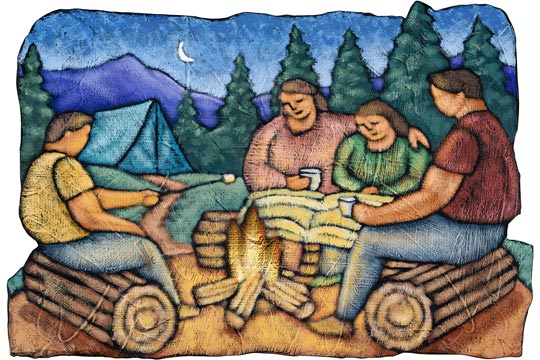
We don’t make disciples of Jesus Christ by engaging others in debate or by lecturing to them about principles of dogma. Jesus’ preferred method of engaging others and teaching about the Kingdom was through storytelling. People are more open to hearing a story about an everyday life experience in which God’s nearness is revealed. As a Church, we need to take our cue from the highly successful TED talks, which effectively persuade and inspire countless numbers of people to transformation of mind and heart on a variety of topics. How do they do it? Not by debating, but rather, through effective storytelling. The experts behind TED talks say that a good TED talk is about two-thirds storytelling, while the other one-third is informative data usually provided in no more than three “chunks.” If we are going to be a Church on the move, we’ve got to learn to become storytellers.
In order to be better storytellers, however, each of us needs to become more aware of our own story. Many Catholics, baptized as infants and sacramentalized as little children, often come to the erroneous conclusion that they do not have a story to tell—no dramatic conversion that brought them as adults to the waters of Baptism and a whole new way of life. So how can we get in touch with our own stories? Try the following.
- Identify significant people in your life. Just as God spoke to his people through Moses and the Prophets, God typically speaks to us through other people. Who are the significant people in your life who have shaped and influenced you and to whom you owe much? No doubt, once you think of these significant people, you will recall stories related to their impact on your life.
- Identify moments of joy (big or small). Throughout Scripture, people who recognize that they have had an encounter with God express that encounter in terms of great joy. By reversing that process, we can come to recognize encounters with God. In other words, by reflecting on moments of joy, whether big or small, we can recognize and tell stories about God’s movement in our lives.
- Identify peak moments of grace. In addition to the everyday little ways that God has manifested his presence to us, each of us can think of a handful of extraordinary moments in our lives when we felt we had come face to face with the infinite, and God’s presence was almost palpable. Perhaps it was a brush with death, a moment of incredible luck or fortune, a dramatic recovery from an unfortunate situation, or an extraordinary experience of beauty. Moments like these make us aware of a power greater than our own and make for inspiring stories.
- Identify milestones in your life. Each of us can identify significant moments in our lives when we reached a milestone: a graduation, a new job, a promotion, a birthday or anniversary, a wedding day, and so on. These events cause us to pause and express gratitude, and when we express gratitude, we find ourselves contemplating the Giver of all good gifts. A story about a milestone in your life becomes a story of faith when you acknowledge God’s grace present within the story.
The parish adult faith formation team can coordinate these efforts as they identify and invite parishioners to write (or videotape) short reflections (200 words) based on one of the above categories and then publish/post them in the parish bulletin, newsletter, Facebook page, and website. Photos of the individuals who write their reflections can accompany the pieces so that parishioners can begin to recognize others in their midst who are working at recognizing God in their everyday lives.
Storytelling creates an emotional connection that cannot be achieved through debate. The New Evangelization is calling us to touch, not only people’s minds, but also their hearts.




young children will be spellbound by a good story. That is what Jesus did so magnificently. He taught by telling great stories. It seems to me that far too many of us feel that story telling is a waste of precious time. However, if Jesus took time for it we should too. I love reading good pieces of literature and then correlating them with the reading ( or better yet ) the retelling of what Jesus said about the given topic, action,or opinion.
Agreed, Margaret…people of ALL ages will be spellbound by a good story!